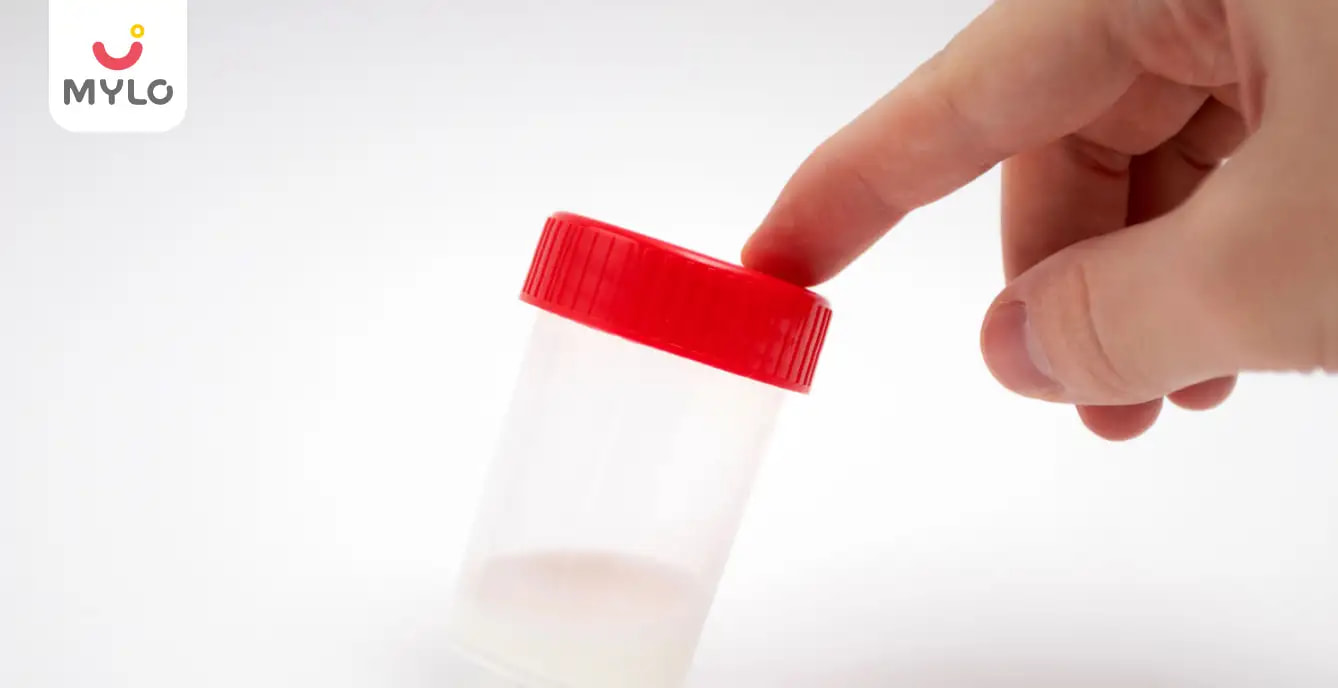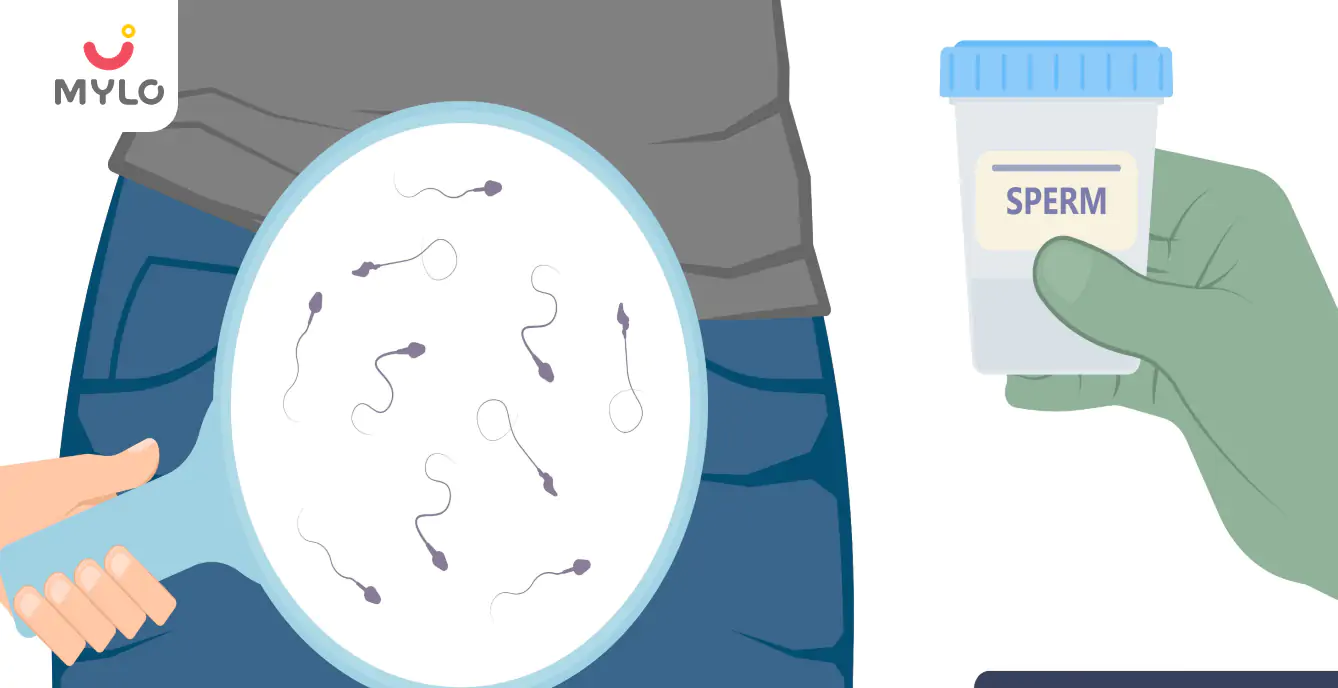Home

Watery Semen: Is It Normal or a Sign of an Underlying Condition?
In this Article

Getting Pregnant
Watery Semen: Is It Normal or a Sign of an Underlying Condition?
Updated on 2 August 2023
Have you ever wondered about the different characteristics of semen and what they might indicate about your fertility? Well, one particular aspect that might keep you up at night is why is my sperm watery. You might be curious whether it's a normal variation or a sign of an underlying condition.
In this article, we will explore what watery sperm or semen is, whether it is normal or a sign of an underlying condition, and what can be done to address it. We will also discuss the difference between thick and watery sperm, the causes of watery semen, when to seek medical help, diagnosis and treatment options, lifestyle changes to improve semen quality, and preventive measures.
What is Watery Semen?
Watery semen refers to semen that has a thinner consistency and a less viscous texture than what is considered normal. It may appear more like water or have a slightly milky appearance. Semen is the fluid that carries sperm and is ejaculated during sexual activity. It is a combination of sperm and various fluids from the male reproductive system, including seminal vesicles, prostate gland, and bulbourethral glands. The consistency and appearance of semen can vary from person to person, and even in the same individual, depending on factors such as hydration, frequency of ejaculation, and overall health.
You may also like : Disadvantages of Releasing Sperm Daily: Debunking Common Myths
Is Watery Semen Normal?
Watery semen can be considered normal, especially in certain situations. Factors such as hydration levels, frequency of ejaculation, and sexual activity can influence the consistency and appearance of semen. If a man ejaculates frequently or is dehydrated, his semen may appear more watery. Additionally, as men age, they may notice changes in the consistency of their semen, which can become more watery over time. However, if it is accompanied by other symptoms or persists for a prolonged period, it may be a sign of an underlying condition that requires medical attention.
Thick Sperm vs Watery Sperm: What's the Difference?
It is important to differentiate between thick sperm and watery sperm. Thick sperm refers to the concentration and quality of sperm cells within the semen. It relates to the overall fertility potential of a man.
On the other hand, watery sperm refers to the consistency and appearance of the fluid itself. In other words, thick sperm is about the sperm cells, while watery semen is about the fluid that carries them. While thick sperm may indicate good fertility potential, watery semen alone does not necessarily imply infertility. It is important to consider other factors, such as sperm count and motility, when assessing fertility.
Also read : Painful Ejaculation and Its Impact on Men's Health: From Stigma to Solutions
What Causes Watery Semen?
Men who experience a watery consistency in their semen naturally wonder why is my sperm watery. There can be several causes for this. Some of the common factors include:
1. Hydration levels:
Dehydration can lead to a more watery consistency of semen. It is important to maintain adequate hydration for overall reproductive health.
2. Frequency of ejaculation:
Frequent ejaculation can result in a thinner consistency of semen. This is because the body needs time to replenish the fluids and nutrients required for the production of semen.
3. Diet and lifestyle:
Poor diet, excessive alcohol consumption, smoking, and drug use can all affect the quality and consistency of semen.
4. Hormonal imbalances:
Hormonal imbalances, such as low testosterone levels, can contribute to changes in semen consistency.
5. Infections and medical conditions:
Certain infections, such as sexually transmitted infections, can affect the quality and appearance of semen. Medical conditions, such as prostate or seminal vesicle issues, may also play a role.
When to Seek Medical Help for Watery Semen
While watery sperm is normal in certain situations, there are instances where it is advisable to seek medical help. If you experience any of the following symptoms or conditions, it is recommended to consult a healthcare professional:
1. Persistent changes in semen consistency:
If your semen consistently appears watery, milky, or has a significant change in consistency, it is worth discussing with a doctor.
2. Pain or discomfort:
If you experience pain or discomfort during ejaculation, it may be an indication of an underlying condition that requires medical attention.
3. Infertility concerns:
If you have been trying to conceive for a prolonged period without success, discussing watery semen with a fertility specialist can help determine if it is a contributing factor.
4. Other symptoms:
If you notice any additional symptoms, such as blood in semen, recurrent infections, or changes in sexual function, it is important to seek medical guidance.
You may also like : Top 4 Kinds of Infertility Treatments to Cure Male Infertility
Diagnosis and Treatment for Watery Sperm
To diagnose the cause of watery semen, a healthcare professional will likely conduct a thorough medical history review, physical examination, and may order additional tests. These tests may include semen analysis to assess sperm count, motility, and morphology, as well as blood tests to check hormone levels.
Depending on the underlying cause, treatment options may vary. For example:
-
Hydration and lifestyle changes: Ensuring proper hydration and adopting a healthy lifestyle can often improve semen quality and consistency.
-
Treating infections: If an infection is identified, appropriate medications will be prescribed to address the underlying issue.
-
Hormone therapy: In cases where hormonal imbalances are identified, hormone replacement therapy may be recommended to restore balance.
-
Surgical interventions: If structural issues, such as blockages or abnormalities in the reproductive system, are detected, surgical interventions may be necessary.
Lifestyle Changes to Improve Semen Quality
In addition to medical treatments, certain lifestyle changes can help improve semen quality. These changes include:
-
Healthy diet: Consuming a balanced diet that includes fruits, vegetables, whole grains, lean proteins, and healthy fats can provide the necessary nutrients for optimal semen quality.
-
Hydration: Staying adequately hydrated by drinking plenty of water throughout the day is crucial for maintaining semen quality.
-
Regular exercise: Engaging in regular physical activity can improve overall health, including reproductive health.
-
Avoiding harmful substances: Limiting alcohol consumption, avoiding smoking, and reducing drug use can have a positive impact on semen quality.
-
Managing stress: High levels of stress can affect hormone levels and reproductive health. Adopting stress-management techniques, such as meditation or counseling, can be beneficial.
Also read : You may also like: Low Sperm Count Signs You Should Never Ignore
How to Prevent Watery Semen
While watery sperm may not always be preventable, there are steps that can be taken to promote reproductive health and potentially improve semen quality. These preventive measures include:
-
Practice safe sex: Using barrier methods of contraception, such as condoms, can help prevent sexually transmitted infections that may affect semen quality.
-
Limit exposure to toxins: Avoiding exposure to environmental toxins, such as pesticides and chemicals, can reduce the risk of reproductive system damage.
-
Regular check-ups: Regularly visiting a healthcare professional for routine check-ups can help detect any underlying issues early on.
-
Maintain a healthy weight: Obesity has been linked to reproductive health issues. Maintaining a healthy weight through a balanced diet and regular exercise can support optimal semen quality.
-
Avoid excessive heat: Prolonged exposure to high temperatures, such as hot baths or saunas, can temporarily affect semen quality. It is advisable to avoid prolonged exposure to excessive heat.
FAQs
1. Is it OK if my sperm is watery?
In many cases, watery sperm is normal, especially if it occurs infrequently and is not accompanied by any other symptoms. However, if you have concerns or notice persistent changes in semen consistency, it is advisable to consult a healthcare professional for further evaluation.
2. Can watery sperm cause fertility issues?
Watery semen alone does not necessarily indicate infertility. Fertility depends on various factors, including sperm count, motility, and morphology. If you are concerned about your fertility, it is recommended to consult a fertility specialist who can assess multiple factors to determine the potential cause.
3. How can I thicken my sperm?
To improve semen consistency, it is important to maintain a healthy lifestyle, including a balanced diet, regular exercise, and proper hydration. If you have concerns about semen consistency, it is advisable to consult a healthcare professional to determine the underlying cause and discuss appropriate treatment options.
Closing Thoughts
Watery semen can be a source of concern for men, but in many cases, it is normal and does not indicate an underlying condition. Factors such as hydration levels, frequency of ejaculation, and overall health can influence semen consistency. If watery sperm is persistent, accompanied by other symptoms, or if fertility concerns arise, it is recommended to seek medical help. A healthcare professional can evaluate the situation, provide a proper diagnosis, and guide you towards appropriate treatment options.
References
Anamthathmakula P, Winuthayanon W. (2020). Mechanism of semen liquefaction and its potential for a novel non-hormonal contraception†. Biol Reprod.
Mason MM, Schuppe K, Weber A, Gurayah A, Muthigi A, Ramasamy R. (2023). Ejaculation: the Process and Characteristics From Start to Finish. Curr Sex Health Rep.



Written by
Madhavi Gupta
Dr. Madhavi Gupta is an accomplished Ayurvedic doctor specializing in Medical content writing with an experience of over 10 years.
Read MoreGet baby's diet chart, and growth tips

Related Articles
Related Questions
Hello frnds..still no pain...doctor said head fix nhi hua hai..bt vagina me pain hai aur back pain bhi... anyone having same issues??

Kon kon c chije aisi hai jo pregnancy mei gas acidity jalan karti hain... Koi btayega plz bcz mujhe aksar khane ke baad hi samagh aata hai ki is chij se gas acidity jalan ho gyi hai. Please share your knowledge

I am 13 week pregnancy. Anyone having Storione-xt tablet. It better to have morning or night ???

Hlo to be moms....i hv a query...in my 9.5 wk i feel body joint pain like in ankle, knee, wrist, shoulder, toes....pain intensity is high...i cnt sleep....what should i do pls help....cn i cosult my doc.

Influenza and boostrix injection kisiko laga hai kya 8 month pregnancy me and q lagta hai ye plz reply me

Related Topics
RECENTLY PUBLISHED ARTICLES
our most recent articles

In Vitro Fertilization (IVF)
Embryo Transfer: The Ultimate Guide to Procedure, Success Rates and FAQs

Male Infertility
Hyperspermia: The Ultimate Guide to Understanding Excessive Semen Production

Reproductive health
Painful Ejaculation and Its Impact on Men's Health: From Stigma to Solutions

Male Infertility
Hypospermia: What Every Man with Low Semen Volume Should Know

Allergies
Eye Flu Alert: The Seasonal Epidemic You Need to Know About

Periods
How Many Days After IUI Should I Get My Period: Understanding the Timeline
- An Expecting Mother's Guide to Glucose Tolerance Test (GTT)
- Difference Between IUI and IVF: Which is Better for You?
- Ovarian Stimulation: Understanding the Process and What to Expect
- IVF Baby Delivery: Will You Have a C Section or Vaginal Delivery?
- How Many Injections for IVF Treatment Do You Really Need
- IUI Failure Symptoms & Reasons: Understanding Why IUI Fails & What to Do Next
- Lactose Intolerance in Babies: A Parent’s Guide to Identifying and Managing it
- TESA IVF: How This Procedure Can Help You Achieve Your Dream of Parenthood
- How Can You Encourage Sensory Play for Your Baby and What are Its Benefits?
- After How Many Weeks IVF Pregnancy Is Safe: Understanding The Ideal Timeline
- Exploring the Senses: 9 Incredible Benefits of Sensory Play for Your Child's Development
- The Ultimate Guide to Childproofing Your Home
- Start Their Love for Reading Early: The Best Books for Baby's First Library
- CMPA (Cow's Milk Protein Allergy): Identifying Symptoms and Understanding Treatment


AWARDS AND RECOGNITION

Mylo wins Forbes D2C Disruptor award

Mylo wins The Economic Times Promising Brands 2022
AS SEEN IN

- Mylo Care: Effective and science-backed personal care and wellness solutions for a joyful you.
- Mylo Baby: Science-backed, gentle and effective personal care & hygiene range for your little one.
- Mylo Community: Trusted and empathetic community of 10mn+ parents and experts.
Product Categories
baby carrier | baby soap | baby wipes | stretch marks cream | baby cream | baby shampoo | baby massage oil | baby hair oil | stretch marks oil | baby body wash | baby powder | baby lotion | diaper rash cream | newborn diapers | teether | baby kajal | baby diapers | cloth diapers |




